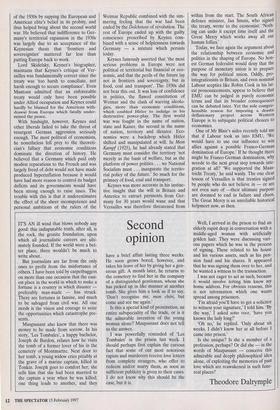IT'S AN ill wind that blows nobody any good: this
indisputable truth, after all, is the rock, the granite foundation, upon which all journalistic careers are ulti- mately founded. If the world were a bet- ter place, there wouldn't be much to write about.
But journalists are far from the only ones to profit from the misfortunes of others. I have been told by carpetbaggers on more than one occasion that the easi- est place in the world in which to make a fortune is a country in which disaster preferably man-made — has struck. There are fortunes in famine, and much to be salvaged from civil war. All one needs is the vision and courage to seize the opportunities which catastrophe pre- sents.
Maupassant also knew that there was money to be made from sorrow. In his story, 'Les Tombales', a happy bachelor, Joseph de Bardon, relates how he visits the tomb of a former lover of his in the cemetery of Montmartre. Next door to her tomb, a young widow cries pitiably at the grave of a marine captain, killed in Tonkin. Joseph goes to comfort her; she tells him that she had been married to the captain a year when he was killed; one thing leads to another, and they
Second opinion
have a brief affair lasting three weeks. He soon grows bored, however, and takes his leave of her by giving her a gen- erous gift. A month later, he returns to the cemetery to find her in the company of a distinguished gentleman, whom she has picked up in like manner at another tomb. She gives him a look as if to say, `Don't recognise me, mon cheri, but come and see me again.'
Is this a special kind of prostitution, an entire subspeciality of the trade, or is it the admirable invention of the young woman alone? Maupassant does not tell us the answer.
I was powerfully reminded of les Tombales' in the prison last week. I should perhaps first explain the curious fact that some of our most notorious rapists and murderers receive love letters from complete strangers, who offer to redeem and/or marry them, as soon as sufficient publicity is given to their cases. I do not know why this should be the case, but it is. Well, I arrived in the prison to find an elderly rapist deep in conversation with a middle-aged woman with artificially golden hair. They were discussing vari- ous papers which he was in the process of signing. These related to his house and his various assets, such as his pen- sion fund and his shares. It appeared that he was signing them over to her, and he wanted a witness to the transaction.
I was not eager to act as such, because it would involve letting him know my home address. For obvious reasons, this is not information which one wants spread among prisoners.
`I'm afraid you'll have to get a solicitor to witness your signature,' I told him. `By the way,' I asked sotto voce, 'have you known the lady long?'
`Oh no,' he replied. 'Only about six weeks. I didn't know her at all before I came into prison.'
Is she unique? Is she a member of a profession, perhaps? Or did she — in the words of Maupassant — conceive this admirable and deeply philosophical idea alone, of exploiting the memories of past love which are reawakened in such fune- real places?
Theodore Dalrymple


























































 Previous page
Previous page